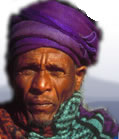THEMES IN THIS
TESTIMONY
Communications

Economics

Family Life

Food Security

Gender

Health

History

Identity

Justice and crime

Land

Livestock

Population

Social Relationships

Click on arrows
to find more
testimonies
featuring
these themes
|
|
Sex
|
female
|
|
|
Age
|
45
|
|
|
Occupation
|
market trader
|
|
|
Location
|
Filaqit, Woina Dega (midlands)
|
|
|
Date
|
March 1997
|
|
summary
A fairly short interview covering several issues but not yielding a great deal in the way of personal testimony. Although the narrator mentions that she was once married and had a farm before she became ill, the interviewer does not ask anything about this.
Although the narrator feels that most aspects of life are harder than they were in past, she mentions the improvement in medical services, including vaccination of children against serious diseases and care of pregnant women, and says she expects life to become easier in the future.
detailed breakdown
|
You will need a password from Panos to view the full
transcript of the interview. To apply for a password, click here.
Once you have a password, click here to go to the beginning
of the transcript. You can also click on any section of the
breakdown of content below and go straight to the
corresponding part of the transcript.
|
| Section 1 |
Land redistribution and how it has brought greater equality – “In the old days the rich used to get the benefits. Now the poor have got land and that’s fair enough.” Disadvantages of land redistribution – deforestation and degradation of land.
|
| Section 2 |
Personal hardship because of sharp rises in cost of living. Examples of price of food “in the old days”: “It would have been better if I had died then.” Brief mention of diseases of animals and farming methods.
|
| Section 3 |
Says she did not receive any land under land redistribution scheme. This is confusing since earlier she mentions owning a farm that was later taken away from her – no explanation given for changes in circumstances. Current development work – digging for water – women carried rocks. Changes in marriage. “In the old days we were married off at the age of seven or eight years. Now they can’t afford to marry off their children. So they send both the girls and boys to school.”
|
| Section 4 |
Education, health, agriculture – expects life to improve in future. Social institutions – baptisms, weddings, celebrations of patron saints’ days more lavish in the past. Divorce - in the past wife could leave husband and keep her land but now this is no longer possible.
|
| Section 5 |
Children’s behaviour – no longer obey their parents. Care of the weak and sick – previously (“in the good old days, during the time of Haile Sellassie”) a shared responsibility; now no one cares.
|
| Section 6-7 |
Benefits of modern education: “I would prefer if the boy is educated and the girl stays at home.” Danger of girls falling pregnant. Describes traditional treatment for syphilis and gonorrhoea.
|
| Section 8 |
Increase in size of families. Women having children at much younger age than in the past. |
|


